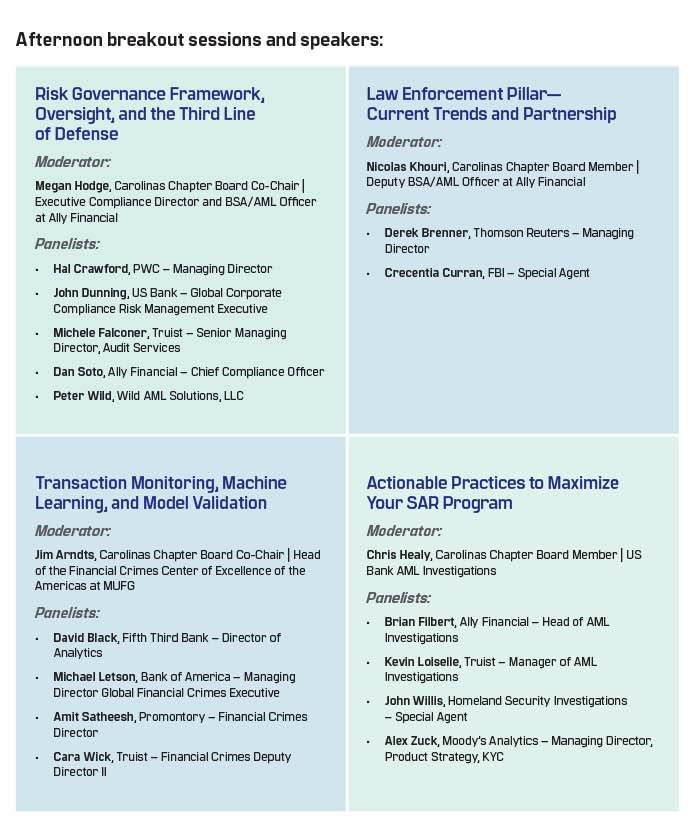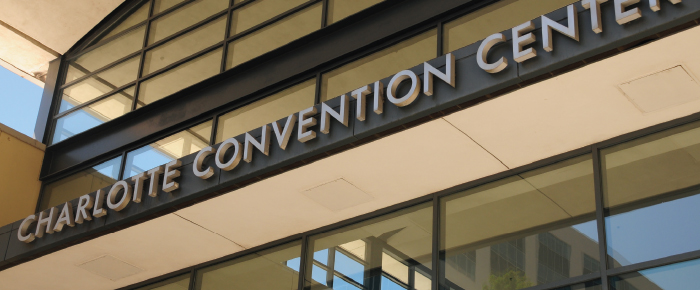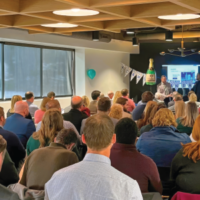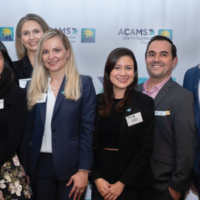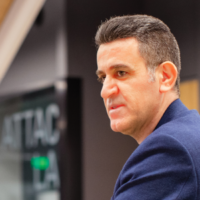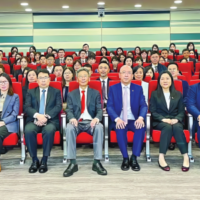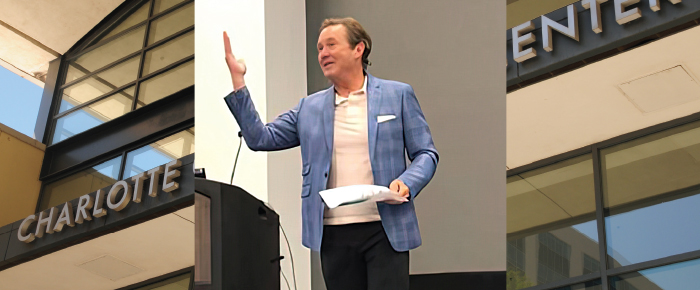
The ACAMS Carolinas Chapter returned to live events this year by hosting its second annual AML and Sanctions Symposium. On September 13, 2022, more than 200 professionals across the southeast gathered at the Charlotte Convention Center for a full day of continuing education, followed by a networking reception. The energy at the symposium was noticeable as attendees had the opportunity to catch up with colleagues, both new and old, many of whom saw familiar faces for the first time since early 2020. The Carolinas Chapter Board organized a robust agenda with morning panels and afternoon breakout sessions.
ACAMS CEO Scott Liles (pictured) kicked off the event with opening remarks. He made a welcomed appearance at his first-ever live chapter event since being appointed CEO in November 2020. Liles commented on the importance of community, highlighting the significance of learning events offered by ACAMS, which brings together professionals across the globe for the common purpose of combating financial crimes. Following opening remarks, the audience heard from Federal Bureau of Investigation (FBI) Special Agent in Charge (SAC) Jeffrey Cannon with a keynote presentation centered around the current environment of domestic and international terrorism. SAC Cannon focused on one of the FBI’s top priorities, which is preventing both foreign and domestic bad actors from carrying out terrorist attacks. A key point of discussion was the difference between homegrown violent extremists (HVEs), who are inspired by foreign terrorist organizations, and domestic violent extremists (DVEs), who are radicalized due to their own political and social ideologies. The recent surge in domestic terrorist acts by HVEs and DVEs escalated in late 2020 and has resulted in a spike in active FBI investigations. The FBI can investigate more than 4,000 active terrorism cases at any given time. SAC Cannon stressed the important role that financial institutions (FIs) play in facilitating the FBI’s investigations through the identification of red flags and mobile indicators of violent extremists, as well as the utility of suspicious activity report (SAR) filings. SAC Cannon urged FIs to be proactive and to reach out to the FBI directly after a SAR filing. The FBI frequently utilizes SAR filings as predicates for case investigations. The key takeaway statement from SAC Cannon was “what was old is new again” regarding how these bad actors facilitate money movement. The FBI is seeing a surge in low-dollar transactions, similar to what was identified in the September 11 terrorist attacks.
The morning sessions concluded with a vigorous roundtable discussion about shared lessons learned and best practices from the landmark years of 2021 and 2022. The roundtable was moderated by Nicolas Khouri, deputy anti-money laundering/Bank Secrecy Act (AML/BSA) officer at Ally Financial and ACAMS Carolinas Chapter board member, and he was joined by the following panelists:
- John Byrne, chairman of the advisory board at AML RightSource
- Mike Hall, SVP, director of AML and sanctions and BSA officer at Fifth Third Bank
- Megan Hodge, executive compliance director and AML/BSA officer at Ally Financial and ACAMS Carolinas Chapter co-chair
- Rick Small, executive vice president, director of the Financial Crimes Program at Truist
Panelists discussed the Financial Crimes Enforcement Network (FinCEN) national priorities and what, if any, actions their respective FIs are taking to prepare for regulatory changes. A central point of the conversation was the fact that the majority of FinCEN’s priorities are already covered by the foundation of existing AML programs. As a best practice, FIs should consider aligning each of the national priorities to their existing programs and performing gap assessments. FIs should question if their current policies, procedures, processes and internal controls address the requirements of a particular priority. If not, begin planning now to identify budget needs, potential implementation challenges and pilot programs to assess operational readiness.
The panel moved on to discuss the Anti-Money Laundering Act of 2020 and, specifically, the challenges presented by FinCEN implementing a beneficial ownership registry. Panelists unanimously agreed that the scale of this effort and the corresponding technology considerations continue to be strained by limited resources at FinCEN. While the U.K. has successfully implemented a similar registry, the size and scale of the U.S. are different from a like-for-like comparison. The panel expects a continued delay in the official rollout of the registry and other directives.
The final topic discussed by the panel was the current sanctions environment that has been expounded by Russia’s incursion into Ukraine. FIs have been strained by the numerous executive orders targeted at Russian oligarchs, certain sectors of the Russian economy, investments, imports/exports and a growing list of specially designated nationals (SDNs). Impacts of increased sanctions activity have manifested through various staffing strains felt by compliance functions as teams grapple with managing alert volumes, dissecting/interpreting executive orders and blocking and reporting to the U.S. Department of the Treasury’s Office of Foreign Assets Control (OFAC) department. First-line business functions have also struggled to determine the extent of their firm’s exposure to Russia. As a potential opportunity to get ahead of future sanctions, the panelists agreed it might be a good idea to start identifying exposure to other jurisdictions that may be subject to upcoming sanctions (e.g., Belarus).
After lunch, attendees made their way to break out sessions of their choice for both afternoon sessions. Topics ranged from risk governance frameworks to tips on how firms can maximize their SAR programs. A summary of key takeaways from the afternoon sessions can be found on the Carolinas Chapter website.1
The day concluded with a networking reception filled with libations, hors d’oeuvres and vibrant conversation. For many attendees, it was their first time attending a live learning event since the COVID-19 pandemic and many expressed gratitude for being able to network face-to-face again. The Carolinas Chapter was thrilled to offer this important opportunity and is looking forward to planning the next live event. The Carolinas Chapter Board would like to thank everyone who made it a priority to attend the event and each symposium sponsor. The event would not have happened without sponsorship support and the generous donation of time from our network of expert speakers from the public and private sectors. To become a member of the Carolinas Chapter and to receive communication about upcoming events, visit the chapter website and follow us on LinkedIn.2
Taylor Chabot, CAMS, head of AML Program Management, TIAA, NC, USA
Iris Smith, CAMS, chief AML and sanctions officer, TIAA, NC, USA
- ACAMS Carolinas Chapter, www.ACAMSCarolinasChapter.com
- ACAMS Carolinas Chapter, LinkedIn, https://www.linkedin.com/company/acamscarolinaschapter/







